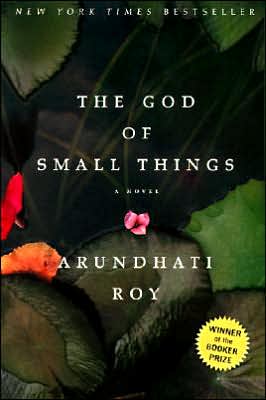

May in Ayemenem is a hot, brooding month. The days are long and humid. The river shrinks and black crows gorge on bright mangoes in still, dustgreen trees. Red bananas ripen. Jackfruits burst. Dissolute bluebottles hum vacuously in the fruity air. Then they stun themselves against clear windowpanes and die, fatly baffled in the sun.
This is the opening of Arundhati Roy's The God of Small Things, a novel I didn't like the first few times I tried reading it. It couldn't approach my heart or soul. I thought it was boring, and kind of bad poetry. The slog that was those first pages, those first few tries.
A question: must you finish a book even if you aren't enjoying it? Some take the marathon runners view. I must finish it, I must finish it. I will not stop, I won't, I won't. Others say screw it (or phrase it more eloquently). Life is too short. There's too much out there I want to read. And put the book down.
There are plenty books I've not finished. Many I have barely started. (This coming from a guy who re-reads his favourite authors ad nauseum and only has about five fingers worth of them writers.) And yet if not for perseverance I'd never have finished Don Quixote, which I did not enjoy while reading but that has certainly stayed with me the way most books never do. Ditto for Joyce's short story collection The Dubliners which was pure dictionary-sending-me-to slog when read, on assignment, for uni, but that I find myself now going back to and admiring the hell out of. Dare I say, loving.
Like its opening, the first pages of The God of Small Things are dense poetic description. The kind that often frighten off those of us interested in coherent plot. I worried this story would be all abstract prettiness with no purpose or concrete narrative line. But then I must have listened to Miles Davis' Kind of Blue [see soundtrack for samples] ten times before it stopped sounding like elevator music and became what to date is my all-time favourite, or at least most listened to, album. In short, I probably give up too easy, too often (10 pages of Ulysses), but sometimes it really is worth the effort.
Roy's only novel to date (it's been over ten years; the writer now works on global political issues) is made like a puzzle. Roy, it seems pertinent to note, was trained as an architect, and the careful design of the novel is such that you need the final puzzle pieces (late pages of the book) to see the big picture, to "get" the story. This at first can be frustrating. But if you make it through the dense opening pages - barely aware how effectively she has pulled you into the humid air of a South Indian town, through swampy smells and mango trees and insects you've barely heard of - you realize that like the director of a good movie, she is taking you on a narrative journey that is far more coherent, with each passing page, than you might at first expect.
The book makes it to my island because the clever design is not just circus tricks. In The God of Small Things Roy is dealing with those subjects we usually cannot talk about. This for me is the purpose of good fiction. The exact opposite of polite conversation. The novel is anything but polite, or easy. It is difficult. The issues are difficult, and I'm being vague in the extreme to not ruin anything.
There are so many storytellers (writers and directors both) who present bleak narratives. Stories that don't hide away and pretend pain isn't real, that hardships aren't universal. But there is a sharp division between those artists that manage to put a little humanity in their stories (and by humanity I do not necessarily mean fairytale endings) and those, like Dancer in the Dark director Lars Von Trier, who seem only to want to lift a reader up to then God-like manipulatively drop them down. There are puppet-master storytellers who are sadistic like that. Arundhati Roy is far, far from.
Her story is undoubtedly painful. But its pain - the whole story - has a beauty - which the single paragraph from the novel I have quoted speaks to - a beauty of hidden realities that bruise our histories but also, hopefully, shine a light all the brighter on the reasons why we are alive.
[For Desert Island Book to read and read and read again #4 click John Steinbeck's East of Eden]
